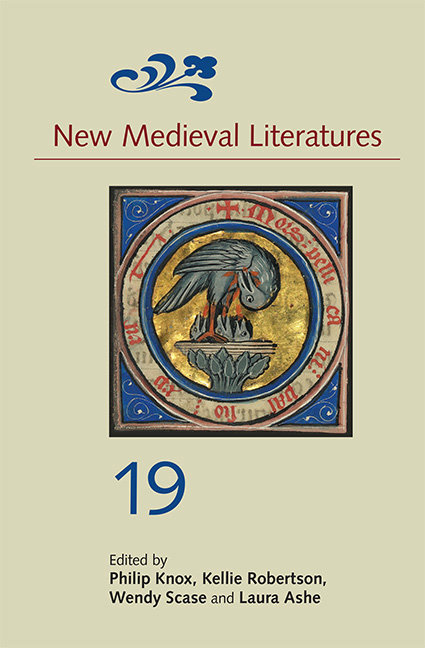Book contents
- Frontmatter
- Contents
- 1 A Scottish or English Saint? The Shifting Sanctity of St Aebbe of Coldingham
- 2 Monastic History-Writing and Memory in Britain and Ireland: A Methodological Reassessment
- 3 Language, Morality, and Wordplay in Thirteenth-Century Anglo-French: The Poetry of Walter de Bibbesworth
- 4 Open Form and Canonic Matter in Trecento Song
- 5 ‘Uninhabited’: Eco-Colonial Anxieties in Late Medieval Icelandic Saga
- 6 ‘Betwen tuo stoles’: The Western Schism and the English Poetry of John Gower (1378–1417)
- 7 Cognition and Conversion in Alain Chartier's Livre de l'Espérance
3 - Language, Morality, and Wordplay in Thirteenth-Century Anglo-French: The Poetry of Walter de Bibbesworth
Published online by Cambridge University Press: 31 August 2019
- Frontmatter
- Contents
- 1 A Scottish or English Saint? The Shifting Sanctity of St Aebbe of Coldingham
- 2 Monastic History-Writing and Memory in Britain and Ireland: A Methodological Reassessment
- 3 Language, Morality, and Wordplay in Thirteenth-Century Anglo-French: The Poetry of Walter de Bibbesworth
- 4 Open Form and Canonic Matter in Trecento Song
- 5 ‘Uninhabited’: Eco-Colonial Anxieties in Late Medieval Icelandic Saga
- 6 ‘Betwen tuo stoles’: The Western Schism and the English Poetry of John Gower (1378–1417)
- 7 Cognition and Conversion in Alain Chartier's Livre de l'Espérance
Summary
Walter de Bibbesworth is known primarily for his Tretiz, a rhyming vocabulary of French written at some point between the years 1230 and 1270. According to a prologue transmitted in some manuscripts, the text was written at the request of Dyonise de Munchensi, wife of the powerful lord Warin de Munchensi. Another work attributed to Bibbesworth, a tençon or debate poem written with the Earl of Lincoln, Henry de Lacy, probably dates from the time of the 1270 Crusade. In it, the young lord Henry asks the older Walter to advise on a dilemma: should he honour his vow to go to the Holy Land for the love of Christ, or stay home for the love of his lady? Walter attempts to convince him to place love of the divine before secular motives. Alongside these two works, Bibbesworth is credited with at least one other poetic composition, ‘Amours m'ount si enchaunté’, which revels in the same sense of wordplay and interest in homophony that we see on display in the Tretiz. The two shorter poems have been almost entirely ignored by scholars, a neglect which the present article aims to correct. In the following pages, I argue that reading the shorter poems alongside the Tretiz can elucidate the grammar of poetry in the lyric materials and the poetry of grammar in the treatise.
Grammar, the heart of the medieval educational curriculum, exceeded the bounds of strictly linguistic study. The disciplines of grammar (what language is) and rhetoric (what language can do) often overlapped in practice, especially in the description of figurative or expressive language; from Antiquity onwards, ‘the principles of grammar were seen as the key to understanding poetic form’. Grammatical study also contained an inalienable moral aspect; as Paul Gehl comments, ‘the very idea of a linguistic norm was charged with moral meaning’, and several of the texts used for study owed their selection to didactic content as much as linguistic interest. To reflect on Latin language, within the context of grammatical education, thus simultaneously compelled reflection on questions of morality and poetic form, and recent scholarship has very fruitfully explored how the educational experiences of medieval authors informed and shaped the literary works they subsequently produced.
- Type
- Chapter
- Information
- New Medieval Literatures 19 , pp. 89 - 120Publisher: Boydell & BrewerPrint publication year: 2019



